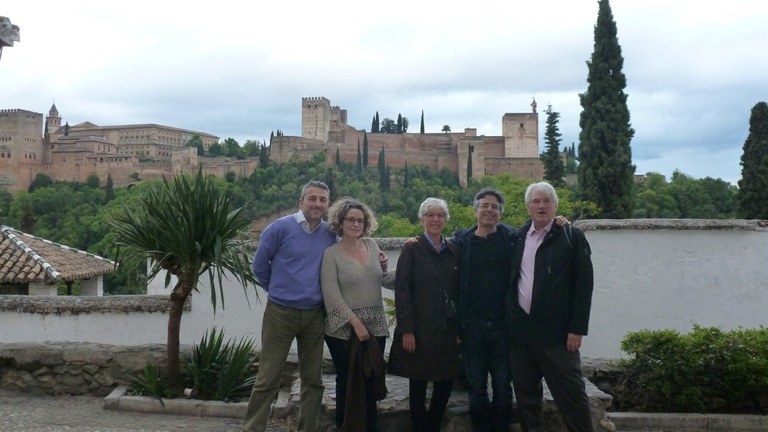Posted: January 6, 2017
by Carolyn Reyes, recent graduate of the M.S. program in Rural Sociology and International Agriculture and Development at Penn State University

A break between meetings in Granada, Spain (Alhambra in the background). Pictured left to right: Mariano Sanchez (University of Granada, and project coordinator), Christina Sanchez, Cathy Whitehouse, Matt Kaplan, & Peter Whitehouse. Photo: Carolyn Reyes.
In May of 2016, just before I completed my Master's degree in the Department of Agricultural Economics, Sociology, and Education at Penn State University, I accompanied Dr. Matt Kaplan, Professor of Intergenerational Programs and Aging (in my department) on a 4-day journey to Granada, Spain to participate in the first national symposium, and a series of side meetings with educators and researchers, focused on intergenerational schooling in Spain.
The purpose of the symposium was to introduce teachers, school administrators, and authorities of Granada to the Intergenerational School model, developed in Cleveland, Ohio by Cathy and Peter Whitehouse in the year 2000. The model embraces the concept of lifelong learning, inviting elderly community members to play a role in the school reading mentors, tutors, and through teaching extracurricular courses. Furthermore, students are placed in mixed-age classrooms, regularly interacting with students younger and older than themselves to instill a sense of shared knowledge and responsibility to help each other learn. The model has had a high level of success at improving student test scores on state and national reading and math comprehensive exams, significantly reducing the socioeconomic and racial divides that often plague inner-city schools.
The pilot project in Spain is now being implemented with 1st and 2nd graders in their language and math classes in Granada and Murcia. However, the project faces a number of logistical and cultural challenges. Logistically, the project is funded by the Spanish government for a period of three years, requiring demonstrated, measurable outcomes in order for funding to continue after the first three years. Outcomes such as higher student test scores may be difficult to obtain in such a short time frame, as teachers, students, and parents adjust to the new learning style. In addition, parents, school children, and teachers are concerned about managing multiple age groups in the same classroom. Therefore, the symposium was coordinated at the end of the 2015-2016 school year to better explain the intergenerational programming and the Intergenerational School model, highlighting some of it's successes in Cleveland. The Spanish research and implementation team invited Dr. Kaplan to provide an overview of intergenerational programming to school teachers and administrators from Granada. The Whitehouse's provided insight into how their model has worked, and how it has expanded in Cleveland.
Those in attendance at the symposium included teachers, school administrators, and local authorities. Attendees had many questions about how model worked, conveying both curiosity and concern about its functionality in Granada and Murcia. The majority of questions were related to logistics, such as how to integrate intergenerational strategies into their day-to-day lessons, or how to cope with behavioral issues. The high level of participation and countless questions by attendees exhibited an enthusiasm for the program, and an eagerness of attendees to adopt the intergenerational school model. The symposium ended on an enthusiastic note, as presenters infused their excitement for intergenerational programming into their expositions.
As visiting scholars, we had the opportunity to take part in a research and planning meeting after the symposium with those organizing and implementing the project. Here, they offered suggestions for research and problem solving as the program is implemented in Granada and Murcia, resulting in collaborative publication commitments.
As a graduate student, I found this opportunity to be invaluable in terms of networking with internationally renowned professionals in education and intergenerational programming. I also had the opportunity to meet and participate in discussions with the founders of the Intergenerational School concept, as well as engage and share ideas with academics spearheading the model in Spain.
Contact Us

- Professor, Intergenerational Programs and Aging
- Email msk15@psu.edu
- Office 814-863-7871
Contact Us

- Professor, Intergenerational Programs and Aging
- Email msk15@psu.edu
- Office 814-863-7871

